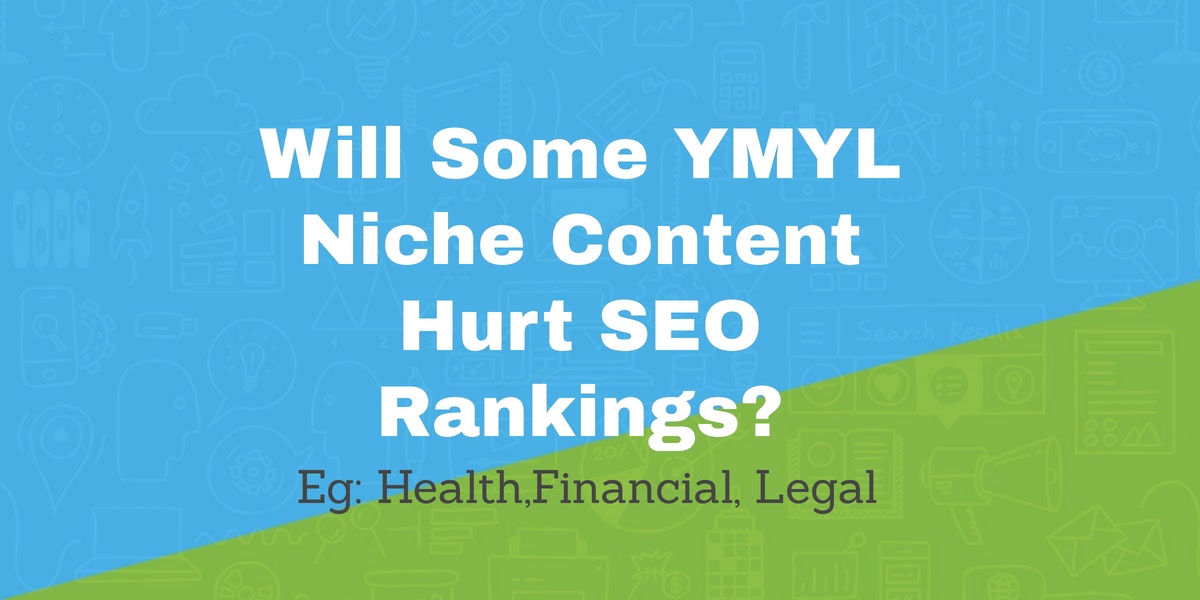As time goes on, Google and other search engines are getting better at evaluating the overall “quality” of a website. However, the overall quality of a site is indeed the sum of all of the pages on a site.
This is common knowledge in the world of eCommerce SEO. Many online stores suffer from “thin content” problems. In a nutshell, if you sell T-shirts, you could have 6 pages about 1 T-shirt. In this scenario, there would be one good, unique page about the T-shirt, then 5 more pages which just say “red” or “XXL”. How this is remedied depends on the shopping platform but that’s a story for another day. The bottom line is, if Google has a problem with 30% of the pages on your site, your entire site is going to take a hit.
Medical, Financial, Legal Content Oh my.
After the August 1, 2018 Google Core Algorithm update, it was clear that Google was heavily scrutinizing websites with YMYL content. YMYL is an acronym for “Your Money or Your Life”. In Google’s own words, YMYL pages are pages which “could potentially impact the future happiness, health, financial stability, or safety of users.”
Lots of websites covering medical conditions, mental health, dietary needs, financial planning, investing, stock trading or which provided legal information got obliterated during this update, mostly due to a lack of authority, which was mostly determined by their backlinks.
The kicker here is that sites with a certain percentage of medical content also took a nosedive also.
Stick to your niche
After the big August 1, 2018 update, hundreds of webmasters reached out to me for assistance with their sites. One of the websites was about dating, and for some reason they had a section of their site dedicated to medical and health topics. I told them I’d trash that. They did, and made other improvements, and when a tweak rolled around they recovered. I documented this in a case study here on the September 27 2018 Google Algorithm Update, and here’s their traffic:
Some types of content will hurt your traffic and rankings. If you have a website about wedding dresses, stick to your niche. If you have a website about cars, don’t go adding a new little section about mental health. Of course, there’s always a little bit of overlap, but if Google thinks you are providing advice on a YMYL topic, it’s not going to end well. Authority links are required (when I say authority I am referring to sites such as cdc.gov, etc.)
It only makes sense.
If you had a restaurant that sold 18 types of whiskey, you’d need a liquor license. Well, if your restaurant sells 2 types of whiskey, you’re still going to need a liquor license for glaringly obvious reasons.
Google scrutinizes websites the same way. I am seeing it more and more.
What’s the percentage?
Unfortunately, Google isn’t giving up it’s secret sauce anytime soon. Could 10% of your pages be low quality, empty, duplicate content? Maybe. Could you have 6% of your content covering bipolar disorder on your website about Chevy trucks? Possibly. I won’t take the risk on my sites. If you want to on yours, that’s ok with me. 🙂
Should I delete the content?
NoFollow, NoIndex, Delete. These are all your friends when it comes to content that you don’t want search engines holding you to strict standards for.
Share your content problems:
Comment below if you were impacted in August, September, October, November or December of 2018 by one of Google’s latest quality updates and you think it was due to veering out of your niche into a YMYL content topic.
- Google “Pure Spam” Penalty Deindexes Sites March 6 2024 - March 12, 2024
- What Happened to ChicagoNow.com? - August 30, 2022
- The December 2021 Google Local Pack Algorithm Update - December 17, 2021






I really appreciate your advice to stick to your niche if it’s not a YMYL website. However do you have any advice on what best could be done for YMYL websites to improve their ranking post medic update.
Mental health sites are heavily scrutinized by Google now. As far as E-A-T goes, the strongest correlation I have seen with rankings depends on the “T”, or TRUST.
So how does Google “trust” a mental health site? Links.
I am not talking about high DA links, or a quantity of links, but links from other trusted mental health resources. These are not links the average person can get. After studying mental health sites which increased in rankings in a post 8/1/2018 world, the links you will need will come from sites such as: